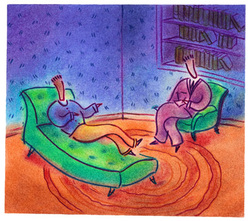
 Many people are enthusiastic about the prospects of therapy, others not so much. On one hand, they may hear of the benefits from a friend or acquaintance. They may observe genuine change in someone. On the other hand, some come more at someone else's bidding. Regardless of the reasons or motivations, the realities of what is involved become daunting, can become a reason for pause, and for some, retreat. Symptoms such as anxiety or depression, or problems in relationships can invite us to seek help, but the symptoms' "nudge" may sometimes result in finding out that it is only the tip of the iceberg that leads to things that we would rather avoid. A rock-solid person who has anxiety attacks may want to stop having the attacks, but their symptoms may reveal a crack in their armor. We have defenses to protect ourselves. Let us be honest. Therapy can be threatening because it usually involves a certain kind surrender of certain defenses. However, we need our defenses. Good therapy helps us find more flexible and adaptive defenses so we can be more open and resilient, balanced by our concerns and needs for safety. Finding out why the mind and body is communicating something to restore order and balance can be emotionally uncomfortable to our normal sensibilities and need for "control." I put quotation marks around control because while we all need some control, at some level ultimate control can be so illusory. For some, these become motivations for not entering into, or continuing with therapy. Others may feel that they have no choice. All of these concerns are realistic and a part of the caring relationship that any deeper and meaningful therapy experience must address openly...
1 Comment
 Many people enter into therapy with the idea that they would like to make their lives better. They have discovered that some things they have been doing in life are no longer working, or in way or another they have reached a dead end or or a crossroad where things need to change. As I begin to work with someone, we find that sometimes even with the best of motivations, they are far more conflicted about change than once thought. Change and growth--including more emotional freedom, enhancing relationships, relief from depression or anxieties, are appealing goals. But not long after, or sometimes even well into treatment, they find that another part of them is holding back. Often they hold onto the familiar. Unstable, un-gratifying, sometimes as painful as maintaining these old behaviors are, they have learned to count on them. The anxiety about positive change, strange as it may seem, about the unknowns of growth, of positive change is more anxiety than they can seem to bear. This gets negotiated in many ways, but often I have found it is as if an unconscious part of them does not really want to change, but wants to perfect their defenses, to be a new and improved version of their own self-defeating patterns! It would be so much easier if everyone would accept us the way we are, including ourselves. But something betrays this notion. Our anxieties, holding back, and our struggles to function more positively seems to imply that we are not accepting something. Strange as it is, some persons, refuse to accept this. Their struggle to take new risks and try new potentially growth producing behaviors, as well as allowing themselves to feel previously unapproachable emotions, obstructs their attempts to change. Very often there is a fear of losing control at the base of this defensive maneuver. Learning about how this operates and how it gets re-enacted in new life situations can be a huge step towards true and significant change. Often it has to build from one emotional truth at a time, with each session marching towards the sometimes more humbling, but also liberating and courageous steps of growth.  Mistakes are an everyday part of life. In fact, experience and a lot of research shows that mistakes are a part of the biggest learning principle, "Trial-and-error learning." But what if we do not learn from our mistakes? Making the same mistake over and over can cause painful consequences and even reduce our quality of life. There are many reasons for what has become a pattern of mistakes. We have many ways that we try to make sense out of them. I will venture a few for exploration. Sometimes mistakes are made when we experience a part of ourselves that is so uncomfortable emotionally that we act (without fully thinking) to get out of the discomfort. So from this perspective, it is a combination of being unable to tolerate a certain feeling or feelings, along with the loss of thinking things through. Another reason, often unknown (but at the same time "known"), is the repetition of something from our past. Strangely, its no longer the past that is the problem, but its unfinished stuff that inserts itself into the present! Much to be learned from here. These are just a few but very important ways of looking at repeated mistakes. It can take a while to get to its roots of them as well as learn to tolerate the emotions we to want to get away. To return to where I started, mistakes can be a way to learn. But when we stop learning from them, we better take a much closer look. Let mistakes become an opportunity to learn. The cost of not going through this self-examination can be too great!  Just as we prepare the way for new plants and flowers in the spring by clearing the soil, softening it, and enriching it with nutrients to give the plant a nice home to grow, relationships require a space and openness to be able to thrive and enjoy both the joys and challenges they bring. And also relationships require attention (e.g., watering). Softening the soil, as I am using the metaphor, is not being too stuck in our ways to hear feedback. If we cannot hear how we are experienced without feeling criticized or being defensive, how can the relationship grow? Sometimes the feedback can make us reflect further about ourselves. Perhaps this is my main point about making room for a relationship, whether we are single or married 25+ years: that without the ability to reflect about what we are told, how do we receive someone--make room for them? Often people want to be accepted for who they are, including not wanting to change themselves. This morning I was told I was impatient. I could feel I am bad for that, I could blame them or say they are too touchy, or I could observe myself and see if I can see it too when it happens. This might make me more open to others, even myself. I am not referring to being overly receptive to people who hurt, exploit, etc., who always seem want us to compromise, while they are less than compromising. Those might be the weeds that need pulling in order for the real flowers to thrive! Sometimes the soil is very hard or difficult. These are like our defenses protecting us against things like past wounds, fears, shame and the like. It is hard to work from there, but it can be rewarding to let more love in.  "Oh, what tangled webs we weave," is an oft cited quote when we struggle with realizing our contribution to life's challenges. The words, when faced openly, bring us to more honesty, but also can help us get back on track in our lives. Sometimes one of the hardest things about growth and change is seeing ourselves and our role in the outcome. Finding what is right with you might need to involve a kind of self-examination that means finding paths that repeatedly are not working. As I heard somewhere, "When nothing is right, go left!" This somewhat clever, even pithy slogan says a lot about what seems like a simple truth. But it is not. We need to first see just how something is not going right, and that sometimes there are decisions we make or how we view things about ourselves that are not working. One of the reasons that this is hard is because we are going on a path that has been shaped over time. In a way, we assume that this path is reality, rather realizing that it is really "our" reality. This is a big step. It is finding what we are doing and beginning to find that it can be tied to the outcome. We can begin to find choices and different paths to see what might fit better. Getting unstuck starts by finding out about these themes. These themes can form the heart of our growth. It is important to ask things like: 1) What are the role of themes of my life? 2) How do I work on them? Steven M. Harris, PhD  Emotional pain is interesting because it is inevitable. Life's twists and turns, including relationships (even good ones) bring their painful moments. While pain is real, I often think pain is life's ultimate "bogey man." Some people spend their whole life running from it. Some experience their emotions in their body, others are gripped by fear and avoid things chronically. Depression can seem like a long-term relationship with pain. One thing is certain, we all wince at idea of real emotional pain. We feel pain from the past, we try to orchestrate all kinds of maneuvers to prevent it in the future, but in my view this reveals how much our difficulty with pain runs (or in worst cases ruins) our lives. We will avoid potentials for big successes to reduce or eliminate potential pain...taking a relationship further, a business opportunity, and many other experiences that might bring us positive things. Pain's power (or actually or resistance to pain) can be crippling. S. Young writes that, "Suffering equals pain multiplied by our resistance to pain." The ability to find the courage, compassion, and acceptance around our feelings of pain has the potential to free us to stop running, become more resilient, have better health...and more...  Symptoms, nightmares, dreams or other confusing experiences often occur to us as something going wrong with us. We want to get over them, get away from or rid of them. But let us take a closer look. I once worked with a woman who complained of chronic emptiness, often with depression. We explored the emptiness together. It was interesting because as we explored the history of this feeling, she recalled a story of telling everyone about her experience of being visited by a beautiful butterfly, how it landed on her and she interacted with it for some time before it flew away. She was amazed and gleefully told everyone, but the feeling was not returned, in fact it was diminished. Although this was later determined to not have been an isolated event, but typical for her experience as a child, we explored how her experience was full of life, and anything but empty. It was full of life, enchantment and wonder! The "emptiness" was a response to what was so empty and devoid of celebrating her amazing experience. Apparently she had internalized this empty, callous, and devaluing response in the place of an appropriate one, of affirming her emerging identity and feeling good about sharing her experience. While this was uncomfortable, her feelings of emptiness were an accurate representation of her experience and clued us into what was needed was something different. Without this uncomfortable symptom to tell us ore about what was going on, we may not have made that discovery so readily. This was the beginning of many explorations and discoveries around her "experience" of emptiness. This inner experience of emptiness represented, among other things, the lack of response (and her inner experience of it) to her emerging sense of self. Her experience was full of life, but the reaction lacking. A rich inner life began to emerge where she once felt only a void, shut off from re-experiencing more pain that might emerge from having an experience of getting excited, only to be ignored and/or diminished. Her symptom of emptiness was an amazing clue for us in our work. Symptoms mean things.  Self-sufficiency can be very desirable. Its often regarded to be unattractive to be clingy, demanding in the modern world. But having a "stiff upper lip," "toughing it out," or to go further, not being able to rely on others might say something else. Attachment informs us about relationships early in life. Attachment is seeking protection and keeping close in response to threat or danger. It illustrates how our early reliance on a caretaker affects later relationships. We learn this as a child. Separate from normal independence, independence that is not as well-adjusted, can look more like some of these signs:
So you can see these behaviors do not sound (on the surface) like someone who feels traumatized. But these behaviors are frequently someone whose attachment process did not make them safe and drove them into self-sufficiency perhaps to a fault (at least when it comes to being able to be close). However, these behaviors often represent monumental defenses against trauma, and in the long run, typically result in symptoms, other complaints, physical problems, and/or relationship, job adjustment problems. Trauma would not be in the vocabulary. Trauma would be to admit something got to you/them. Being able to work with feelings that get activated in a relationship can help the individual tolerate more, be able to be closer, and struggle but feel stronger in relationships and in life.  ...OR RELATIONSHIPS: THINGS JUNGIAN. Carl Jung, citing many ancient traditions, indicates that within every man there is the reflection of a woman (his anima), and within every woman there is the Reflection of a man (her animus). Because we are not often aware of this, we tend to project our sexual opposite onto our partners (although different in gay relationships, degrees of "masculine" and "feminine" dimensions are distributed in the relationship). So a man will find a woman who suitably fits his inner feminine. Jungian analyst John Sanford writes, "...a woman who carries such a powerful projection is pleased, at least at first. She feels flattered and valued, and though she may be dimly aware of it, enjoys a feeling of considerable power. The woman usually regrets the situation in time, however, as she experiences the disagreeable side of being the carrier of another person's soul. She eventually will discover that the man begins to suffocate her. If the woman projects onto a man, she is fascinated by him, drawn to him, sees him as the ultimate man and ideal lover." She can become larger than life to her, but this can result in missing out on "the creative flame within herself, having displaced it onto the man," writes Sanford. The man may also feel this as flattering, but can soon feel overwhelmed by what may feel clingy and demanding at its worst. So what feels good and draws us together may also drive us into conflict. The solution does not have to be ending the relationship. Self-exploration and discovery can enhance a relationship by learning what we project and learning to communicate effectively when we feels someone may be projecting onto us.  Many relationships aspire to be equal, or draw lines of authority as their religious customs and beliefs direct. However, sometimes a closer look at relationships reveals a different story. The balance of power, whether we prefer to call it that or not, is important to know for us to live with each other. Sometimes the seemingly over-dominant partner can be like the child who demands that everything be their way. Also a very dependent individual who seems to wield no power, can demand constant attention--this can be very powerful. Knowing our roles and how we work together is very important to the harmony (as well as the working out of the disharmony) in a relationship. Many couples have a real knack for this. The late president Gerald Ford was once asked something about who was more in charge in his marriage, and he answered (I roughly paraphrase) that depending upon the day or the task, it could be 75% himself and 25% Betty, or 25% himself and 75% Betty at another time. This appears to illustrate the flexibility and perhaps the communication necessary to respond to the demands of the relationship. The more this evolves with communication (particularly when the balance of power is promoting resentment) the more a couple can effectively work together. Probably more important than fixed roles, is communication and understanding what those roles will be. |
steve harris, phdLicensed Psychologist Archives
January 2022
Categories
All
|
 RSS Feed
RSS Feed